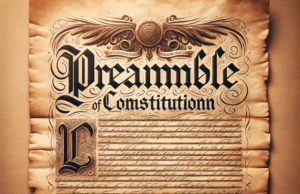Supremacy Clause

Understanding the Supremacy Clause in Article 6 of the Constitution
Introduction:
Article 6, Section 1 of the United States Constitution contains the Supremacy Clause, which establishes the Constitution as the supreme law of the land and sets the federal government above the individual states. In this article, we will delve into the Supremacy Clause, its purpose, history, and significance in American society.
Section 1: What is the Supremacy Clause?
The Supremacy Clause in Article 6, Section 1 of the Constitution establishes that the Constitution, along with federal laws and treaties, take precedence over state laws. It means that if there is a conflict between federal and state law, the federal law prevails. The clause ensures consistency in governance across the United States and gives the federal government the authority to enforce policies and laws critical to the functioning of the nation.
Historical Context
The Supremacy Clause was added to the Constitution in the late 18th century, during the Constitutional Convention. The Founding Fathers recognized the importance of having a strong, centralized government while also respecting individual states’ rights. They wanted to ensure that the federal government had the necessary authority to maintain order and protect the nation from the potential chaos of conflicting state laws.
James Madison, known as the Father of the Constitution, argued that the Supremacy Clause was essential to ensure the Constitution and federal laws were effective and enforced across the country. Its inclusion was an important step towards creating a federalist system that balanced the power of the central government with that of the individual states.
Significance of the Supremacy Clause
The Supremacy Clause has played a critical role in various landmark Supreme Court cases, including Marbury v. Madison (1803), McCulloch v. Maryland (1819), and Brown v. Board of Education (1954). It has ensured the civil rights movement’s success, especially in the integration of public education.
Furthermore, the Supremacy Clause acknowledges that federalism requires balance, and that while the federal government has the power to enforce the Constitution and federal laws, individual states have been granted independence, which ensures individual and state rights are protected. It also recognizes that the Tenth Amendment grants powers to the states that are not specifically granted to the federal government.
Despite the importance of the Supremacy Clause, it has been the subject of controversy and various legal challenges in the past. One example is the Nullification Crisis of 1832, when South Carolina declared null and void a tariff law signed into law by President Andrew Jackson. It was the first time a state had ever claimed nullification and challenged federal authority. Although the crisis was resolved peacefully, it highlighted the possibility of tension and conflict between the federal government and the states.
Conclusion:
The Supremacy Clause is a crucial element of the United States Constitution, ensuring that the Constitution, federal laws, and treaties prevail over conflicting state laws. The clause has helped promote consistency in governance, secure individual and state rights, and ensure civil liberties. It is also a testament to the Founding Fathers’ wisdom, who knew that the balance of power between the federal government and the states was essential to the nation’s functioning. Despite its challenges, the Supremacy Clause remains an integral component of the United States Constitution to this day.
The Supremacy Clause is the name usually given to the second clause of Article 6 of the U.S. Constitution, which established two things: that the Constitution is “the supreme Law of the Land” and that all laws of all states and the Federal Government will be subordinate to the Constitution. The Supremacy Clause has become one of the core elements of stare decisis, or judicial review as set forth in Chief Justice John Marshall’s ruling in the case of Marbury v. Madison.












